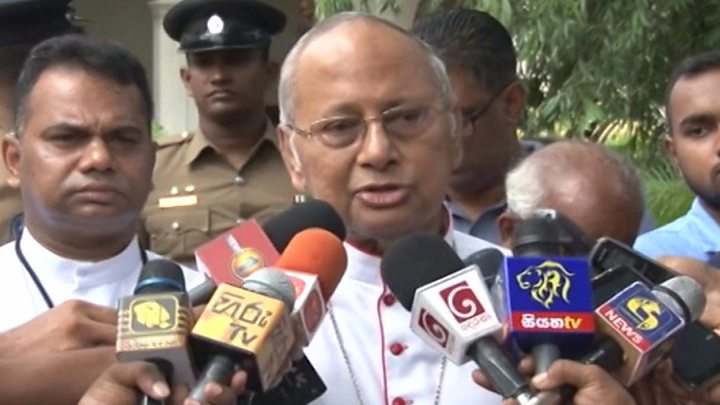Sri Lanka attacks: Country under curfew after bomb attacks kill 200

Sri Lanka has been placed under a nationwide curfew, as the government responds to a string of deadly bomb attacks on Sunday.
More than 200 people were killed and hundreds more injured in eight blasts that targeted busy luxury hotels and Easter services at churches.
The government has not yet attributed blame for the attacks.
There are also reports of social media networks being temporarily limited to try and stop misinformation spreading.
Popular messaging services like WhatsApp and Facebook are said to be unavailable to many.
Late on Sunday, the air force said an improvised explosive device had been found and disposed of close to the country’s main airport in the capital, Colombo.
“A PVC pipe which was six feet [1.8m] in length containing explosives in it was discovered,” spokesman Gihan Seneviratne told local media.
How did the attacks unfold?
The first reports of explosions came at about 08:45 (03:15 GMT) local time – with six blasts reported within a small space of time.
Three churches in Negombo, Batticaloa and Colombo’s Kochchikade district were targeted during Easter services and blasts also rocked the Shangri-La, Kingsbury and Cinnamon Grand hotels in the country’s capital.
As police hunted those responsible, two further explosions were reported.
One blast hit near the zoo in Dehiwala, southern Colombo, and an eighth was reported near the Colombo district of Dematagoda during a police raid, killing three officers.
It remains unclear who was behind the attacks, but 13 arrests were made by police on Sunday.
The government has said they believe suicide bombs were used at some of the sites.
During a news conference on Sunday evening, Prime Minister Ranil Wickremesinghe addressed rumours that officials had had prior intelligence of forthcoming attacks.
“We must look into why adequate precautions were not taken. Neither I nor the Ministers were kept informed,” he said.
“For now the priority is to apprehend the attackers,” he added.
Government officials have called for the public to remain calm while investigations take place.
Airlines have said people are still able to travel to Bandaranaike International Airport in spite of the curfew.
Travellers have been told to produce their boarding pass and identification at checkpoints and arrive four hours before their scheduled departure.
Who are the victims?
The vast majority of those killed are thought to be Sri Lankan nationals, including scores of Christians who died at Easter church services.
The country’s Ministry of Foreign Affairs says it believes 36 foreign nationals are among the dead, with most still unidentified at a Colombo morgue.
The international victims include:
- At least five British citizens – including two with joint US citizenship
- Three Danish citizens
- One Portuguese citizen and three Indian nationals, according to Sri Lankan officials
- Two engineers from Turkey, according to Turkish news outlet Anadolu
- One person from the Netherlands
How has the world responded?
World leaders have been offering their shock and condolences to Sri Lanka over the deadly blasts.
Several prominent international monuments, including the Eiffel Tower, were dimmed or lit in Sri Lana’s colours in solidarity on Sunday night.
Pope Francis, in his traditional Urbi et Orbi speech at the Vatican, condemned the attacks as “such cruel violence” targeting Christians celebrating Easter.

Media playback is unsupported on your device
A spokesperson for UN Secretary General António Guterres said he was “outraged” by the attacks, and expressed his hope the perpetrators would be “swiftly brought to justice”.
UK PM Theresa May tweeted her condolences, saying the “acts of violence against churches and hotels in Sri Lanka are truly appalling”.
US President Donald Trump tweeted “heartfelt condolences” for the “horrible terrorist attacks”.
The leader of New Zealand, where deadly mosque attacks killed 50 last month, labelled the bombings “devastating”.
“Collectively we must find the will and the answers to end such violence,” Jacinda Arden said.
What’s Sri Lanka’s recent history?
Sunday’s attacks are the deadliest seen in Sri Lanka since the end of the country’s civil war in 2009.
The civil war ended with the defeat of the Tamil Tigers, who had fought for 26 years for an independent homeland for the minority ethnic Tamils. The war is thou
Read More



